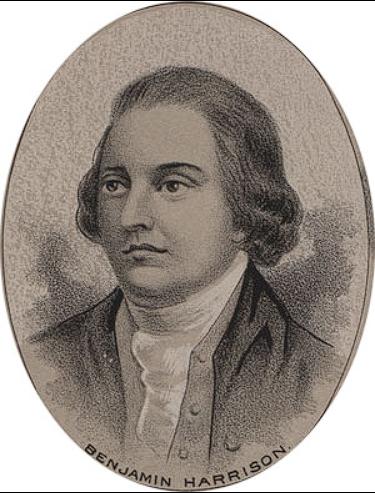In the sweltering heat of a Philadelphia summer, 1776, as brave men prepared to inscribe their names on a document that would alter the course of history, a chilling prophecy echoed through the room. Benjamin Harrison, a man of imposing stature, turned to the slender Elbridge Gerry and declared, “Mr. Gerry, when we are hanged for this, I shall have the advantage. My weight will send me swiftly to the angels, while you, with your lightness, will dance in the air for an hour or two.” This dark jest, though delivered with a hint of humor, underscored the stark reality: they were gambling their lives on an uncertain future.

The Shadow of the Gallows: “A Real Danger”
- Defiance of the Crown: “The Risk of Execution”:
- Signing the Declaration wasn’t merely a symbolic gesture; it was a potential death warrant should the Revolution falter. “They weren’t just signing a document; they were signing their own potential death certificates,” historian Dr. Elizabeth Ross emphasizes. “The British were not known for their leniency.”
- This was a high-stakes gamble, a direct challenge to the world’s most formidable empire.
- The Fear of Capture: “A Grim Possibility”:
- The ever-present threat of capture by British forces cast a long shadow over the signers. “They were acutely aware that capture meant the gallows,” biographer John Adams explains. “It was a grim reality they faced daily.”
- This was no theoretical threat; it was a tangible danger, a constant reminder of the perilous path they had chosen.
- Harrison’s Gallows Humor: “Nervous Laughter”:
- Harrison’s dark jest, though laced with humor, reflected the very real peril they faced. “It was a coping mechanism, a fleeting moment of levity amidst overwhelming fear,” historian Mark Evans notes. “The nervous laughter that followed likely filled the room.”
- This was more than a joke; it was a human moment, a shared acknowledgement of the risks they were taking.
Arnold’s Vengeance: “A Different Kind of Wrath”
- Arnold’s March to Richmond: “A Failed Capture”:
- In 1781, the infamous traitor Benedict Arnold marched up the James River towards Richmond, targeting Harrison’s home, Berkeley. “Arnold was on a personal mission, seeking to capture Harrison,” historian Sarah Davies recounts. “But Harrison and his family managed to escape just in time.”
- This was a personal vendetta, a pursuit of a man who dared to defy the Crown.
- Ransacking Berkeley: “A Display of Frustration”:
- Frustrated by his failure to capture Harrison, Arnold resorted to ransacking Berkeley, stealing and burning valuable possessions. “It was an act of pure frustration, a petty display of vengeance,” historian Robert Greene states. “Unable to seize Harrison, he sought to destroy his home.”
- This was a symbolic act of destruction, an attempt to strike at the heart of the rebellion.
- Arnold’s Claim: “A Prize if the Revolution Failed”:
- Arnold, admiring the house, spared it from complete destruction, intending to claim it as his prize should the Revolution fail. “He envisioned it as his reward, a trophy of his anticipated victory,” historian Laura Smith explains. “But he grossly underestimated the resilience of the American spirit.”
- This was a delusion, a miscalculation of the colonists’ unwavering determination.
A Legacy Endures: “Changed the Course of History”
- Victory and Legacy: “Their Efforts Bore Fruit”:
- The Revolution’s outcome defied Arnold’s expectations. Harrison and Gerry lived to witness the fruits of their labor, the birth of a new nation. “They risked everything, and they prevailed,” historian David Roberts affirms. “Their courage irrevocably altered the course of history.”
- This was a testament to their unwavering belief in the cause of independence.
- Harrison’s Return: “Virginia’s Fifth Governor”:
- Harrison returned to Berkeley, continuing his service to the fledgling nation, eventually becoming Virginia’s fifth governor. “He was undeterred by the specter of death,” biographer James Wilson notes. “He was a patriot to his core.”
- This was a reaffirmation of his commitment, a dedication to the newly formed republic.
- A Presidential Lineage: “Carried Forward by Descendants”:
- Harrison’s legacy extended through his descendants, with two of them, William Henry Harrison and Benjamin Harrison, becoming Presidents of the United States. “His lineage became woven into the fabric of American history,” historian Emily Carter observes. “His story underscores how the actions of a few can shape a nation’s destiny.”
- This was a continuation of a legacy, a testament to the enduring impact of their choices.
Conclusion:
Benjamin Harrison’s grim prophecy, a fleeting moment of dark humor amidst profound danger, highlights the immense risks undertaken by the signers of the Declaration of Independence. Their courage, fueled by an unwavering commitment to liberty, ultimately reshaped the world, leaving a legacy that resonates to this day.
